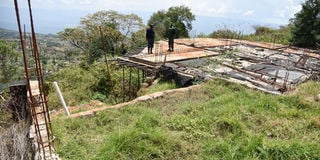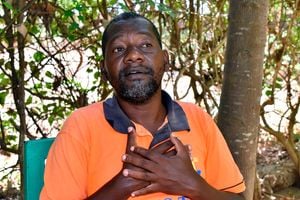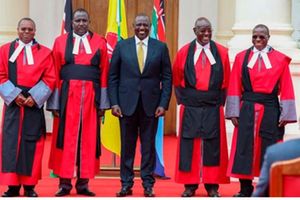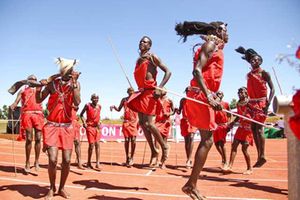
The incomplete house which was meant to be a one-storey official residence for the Elgeyo-Marakwet County Governor at Kamariny.
I was reading a 1981 paper in the journal of the African International Institute by Michael Kenny, Mirror in the Forest: The Dorobo Hunter-Gatherers as an Image of the Other, and it is the kind of title and reading that could easily get you to never read anything in your life again. But, from the outset, “Dorobo” is derogatory.
I was researching the original inhabitants of Mt Kenya East because, at the back of my mind, I’m irritated in the extreme by experiences from childhood of old men my grandfather’s age subtly discriminating against people of mixed heritage.
Some families were referred to as “Ssthamburu”, “sstha” being a sound found in no other language or dialect but Imenti from Abothuguchi, and used by people only of a certain (advanced) age. Others were referred to as the “people from Muthaarrra” or as “the ones who came recently”.
And I have always wondered: Whose land is it anyway? That’s why I was reading ancient papers. The Meru, in all their variants, Kenny’s “Dorobo”, Kikuyu and the so-called proto-Nilotes (I suppose this is a colonialistic reference to our neighbours the Laikipia Maasai and our mbrothers the “Ssthamburu”).
But it is a comment by Kenny that gave rise to today’s column. Kenny’s “Dorobo” men were hunters, the women gatherers, their economy summarised this way by Kenny: “With the exception of honey there is little in the way of storable wealth among them, and hence little inequality based upon it.”
Can you imagine living in an economy where you generate nothing that you can keep and transfer? The Bantu were only a little better than the hunter-gatherers: Always on the move, never settling anywhere long enough to develop a writing system—or learn one—committing to memory, in stories and songs, their entire history.
There is a limit to how much information a song can contain. Inability to store and pass on information is a severe shortcoming in the development of civilisation. Because our lifespans are so short, our progress depends on our capacity to pass on the torch of our achievements to the next generation, who, in turn, do their bit and hand over to the next.
The cathedral builders of Europe would start, then hand over to their sons and their sons would do the same to their grandsons. The first two generations would probably not worship in the grand church.
Like the hunter-gatherers, our post-Independence dispensation is not built for generational handover: It depends on each wave of leaders coming to office with their ideas and projects and rejecting the earlier ones as belonging to the former “discredited” regime.
Big projects that require 50 or 100 years obviously are beyond the comprehension of the political class, who are more likely to think in five-year cycles and not see the country as a whole but as divided into areas that either give them votes or don’t give them votes.
Nothing of value can be achieved in a few years. The system we have created is suited to tickling the egos of under-achieving politicians, not for forging long-term prosperity and development for our people. Other parts, such as in certain sections of South African society, have 700-year plans for Africa. What are our long-term plans?
If you want to know that our thinking is stunted, just look at the way the wealthiest people in our society make money and how they spend it. They make money, many times, by stealing it.
One would reluctantly forgive them if they spent that money in creating sustainable and shared generational wealth; but they spend it on expensive Italian clothes and building apartments. In other words, they take the money out of the economy and either burn it abroad or store it in brick and mortar.
A normal apartment in the best of times has a payback period of eight years. I don’t know how long it takes for a mall to pay back the cost of construction but it cannot be much shorter. But if you steal Sh5 billion, then you talk to your Korean friends and they help you to set up a spare part factory on Mombasa Road and also help you to get customers.
With time, and as confidence grows and you build better partnerships, you could diversify and manufacture more valuable parts and, eventually, have a global operation, generating huge money. This requires vision, risk-taking, hard work and resilience. The average politician just wants to yak with his friends, eat roast meat, drink beer and fornicate.
Kenya must institutionalise and permanentise its development strategy and institutions. The current government is led by people who served in the Kibaki administration. They should bring out the blue-prints of that government, update them and continue with their implementation.
They should revive the institutions of that age, like the Social and Economic Council with talent from all over the world, and make it a permanent feature of the national thinking. Institutionalise similar think tanks for critical sectors like security to tap global expertise and carry forward the momentum of our country.
Unless we do, the difference between us and those pre-colonial “Dorobo” will just be our expensive clothes.
- Mr Mathiu, a former Editor-in-Chief of Nation Media Group, is a media consultant at Steward-Africa. [email protected].










